
Copernical Team
Huayi-1 suborbital rocket makes debut flight
 The debut flight of Huayi-1 suborbital rocket took place on Friday afternoon at a testing field in northwestern China, carrying an experimental satellite to an altitude of 250 kilometers, according to a joint statement from the rocket and satellite makers.
The Huayi-1 rocket blasted off at 2:30 pm, transporting the Agile Testbed experimental satellite and a biological experimental payload
The debut flight of Huayi-1 suborbital rocket took place on Friday afternoon at a testing field in northwestern China, carrying an experimental satellite to an altitude of 250 kilometers, according to a joint statement from the rocket and satellite makers.
The Huayi-1 rocket blasted off at 2:30 pm, transporting the Agile Testbed experimental satellite and a biological experimental payload STOKE Space Raises $65M Series A to Make Space Access Sustainable and Scalable
 Reusable rocket developer STOKE Space has announced the close of a $65 million funding round that the company will use to develop its fully and rapidly reusable rocket. The funding will enable the company to conduct flight tests with its reusable second stage.
The Series A funding round was led by Breakthrough Energy Ventures and included new investors Spark Capital, Point72 Ventures, Toyo
Reusable rocket developer STOKE Space has announced the close of a $65 million funding round that the company will use to develop its fully and rapidly reusable rocket. The funding will enable the company to conduct flight tests with its reusable second stage.
The Series A funding round was led by Breakthrough Energy Ventures and included new investors Spark Capital, Point72 Ventures, Toyo Two Astronauts Receive Assignments for NASA's SpaceX Crew-6 Mission
 NASA has assigned two crew members to launch on the agency's SpaceX Crew-6 mission - the sixth crew rotation flight aboard a Crew Dragon spacecraft to the International Space Station.
NASA astronauts Stephen Bowen and Woody Hoburg will serve as spacecraft commander and pilot, respectively, for the mission. The agency's international partners will assign additional crew members as mission s
NASA has assigned two crew members to launch on the agency's SpaceX Crew-6 mission - the sixth crew rotation flight aboard a Crew Dragon spacecraft to the International Space Station.
NASA astronauts Stephen Bowen and Woody Hoburg will serve as spacecraft commander and pilot, respectively, for the mission. The agency's international partners will assign additional crew members as mission s Microlauncher competition: first payload winners chosen
 The satellite market is thriving and satellites themselves are becoming ever smaller and lighter. Around 90 percent of the satellites that will be launched into space over the next decade weigh less than 500 kilograms, which puts them in the 'small satellite' category.
They span a wide range of applications, from telecommunication services and monitoring of Earth's land, air and water mass
The satellite market is thriving and satellites themselves are becoming ever smaller and lighter. Around 90 percent of the satellites that will be launched into space over the next decade weigh less than 500 kilograms, which puts them in the 'small satellite' category.
They span a wide range of applications, from telecommunication services and monitoring of Earth's land, air and water mass SpaceX launches Turksat-5b
 SpaceX launched a communications satellite from Florida overnight Saturday for the Turkish company Turksat. Elon Musk's rocket firm launched the Turksat 5B satellite aboard a Falcon 9 rocket from Complex 40 at Cape Canaveral Space Force Station during a two-hour window that opened at 10:58 pm.
SpaceX launched a communications satellite from Florida overnight Saturday for the Turkish company Turksat. Elon Musk's rocket firm launched the Turksat 5B satellite aboard a Falcon 9 rocket from Complex 40 at Cape Canaveral Space Force Station during a two-hour window that opened at 10:58 pm. New space telescope to uncover secrets of Universe's origins
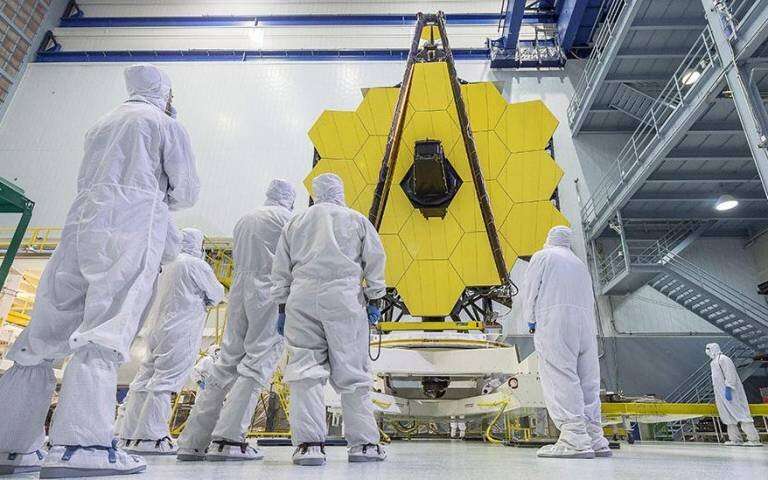
The NASA-led James Webb Space Telescope, which includes hardware designed and built at UCL and which will image the very first stars to shine in the Universe, is scheduled to be launched into space later this month.
The telescope, one of the great space observatories following Hubble, will be launched on-board the Ariane rocket from Europe's spaceport in French Guiana on or after Friday 24 December. It will take 30 days for the telescope to reach the Lagrange point 2, about a million miles from Earth, where it will begin operating. UCL astronomers will be among the first to analyse its observations of the Universe.
The mission—a partnership between NASA, the European Space Agency (ESA) and the Canadian Space Agency (CSA) – is expected to make breakthrough discoveries in all fields of astronomy by investigating the light of the Universe at (invisible) infrared wavelengths.
A team at the UCL Mullard Space Science Laboratory designed and built a key piece of hardware for one of the telescope's four instruments, a near-infrared spectrometer called the NIRSpec. About the size of a double bed, the NIRSpec measures light split into different wavelengths.
SpaceX launches 52 Starlink satellites from California base
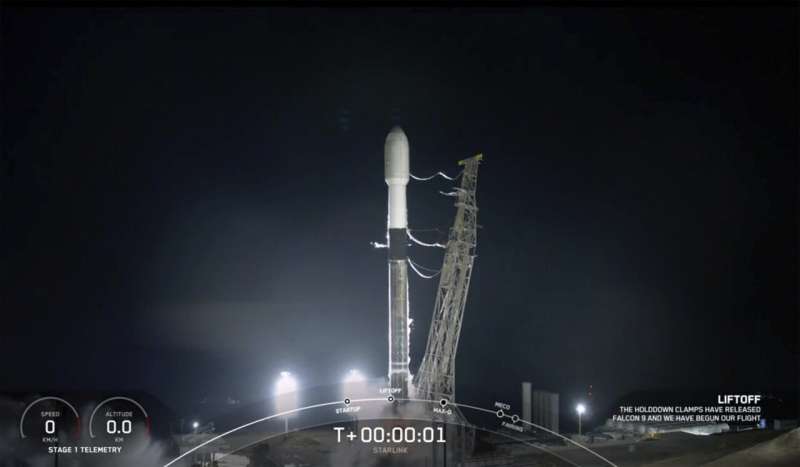
NASA Sets Coverage, Invites Public to View Webb Telescope Launch
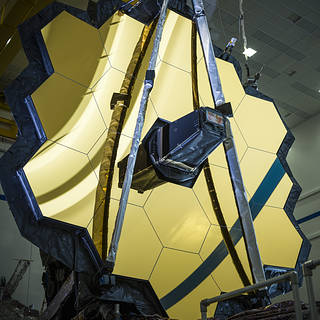 NASA will provide coverage of prelaunch, launch, and postlaunch activities for the James Webb Space Telescope, the world’s largest and most powerful space science telescope.
NASA will provide coverage of prelaunch, launch, and postlaunch activities for the James Webb Space Telescope, the world’s largest and most powerful space science telescope. Webb launch confirmed for 24 December
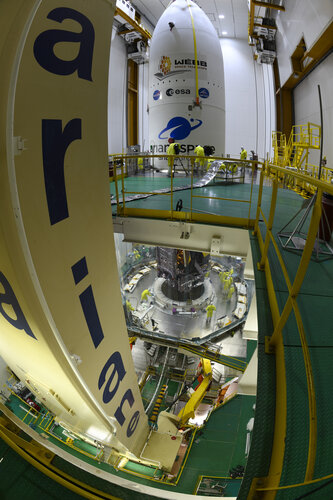
The James Webb Space Telescope is confirmed for the target launch date of 24 December, at 12:20 GMT / 13:20 CET.
FAA: Georgia spaceport decision near, but more study needed
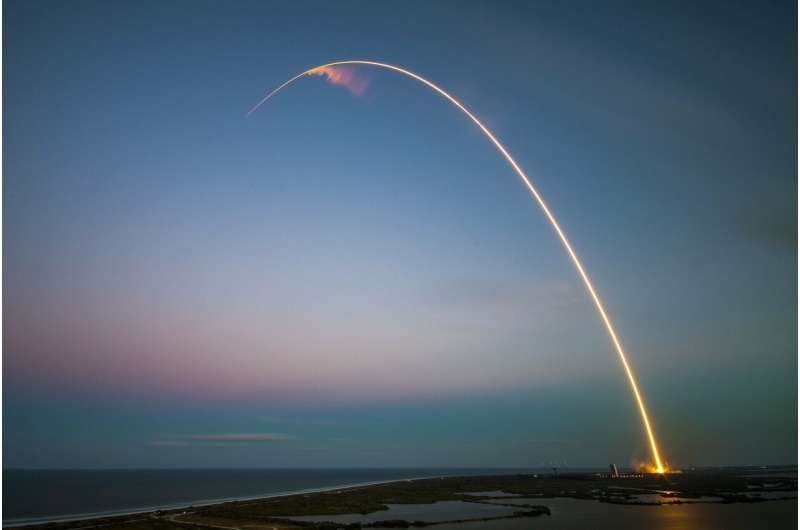
A federal agency expects to announce its decision Monday on whether to allow a launchpad that would send commercial rockets into space from coastal Georgia.
However, the Federal Aviation Administration is emphasizing that a license authorizing Camden County to operate a spaceport would not yet permit the launch of any rockets.
In a letter released Friday by the FAA, the agency said a more comprehensive review would be needed before any rockets can be launched from Georgia.
Even if the license for Spaceport Camden is approved, "it would not authorize a single launch," an FAA executive wrote to the U.S. Department of the Interior.
"Simply put: to obtain a Vehicle Operator License, many more reviews remain, and no outcome is guaranteed," the letter stated.
Any company seeking to launch from the site would need to obtain a Vehicle Operator License and undergo a separate environmental and safety evaluation, according to the FAA.
Camden County, in the southeastern corner of the state, has spent nearly 10 years and $10 million pursuing the goal of having what would be the nation's newest commercial spaceport.
